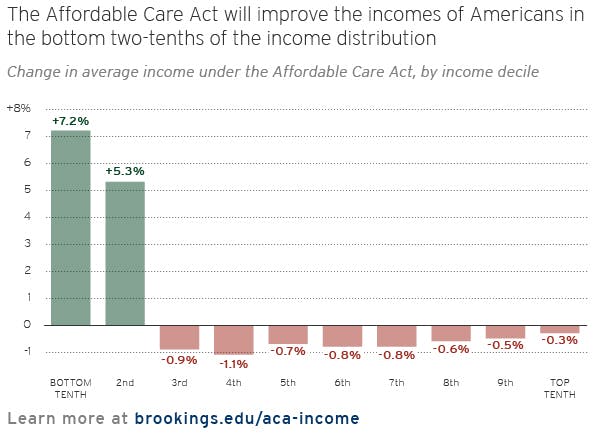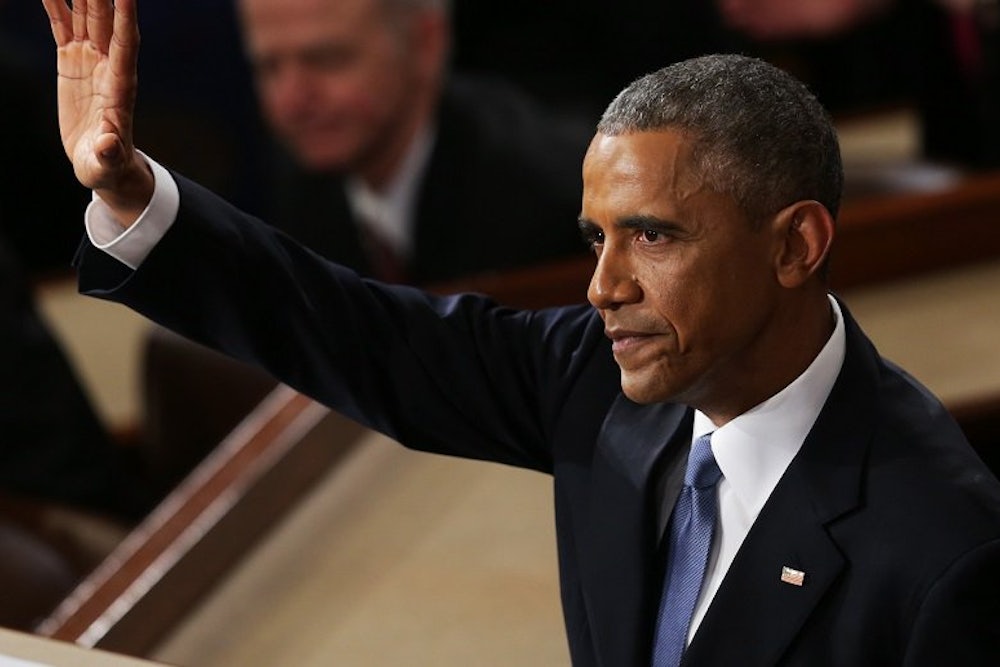On Monday, President Barack Obama’s favorability rating hit 50 in the Gallup tracking poll for the first time since June 2013, with his unfavorable rating at 45 percent. That’s a 22-point improvement since the midterm elections, when Obama’s approval rating was 39 percent and his disapproval rating was 56 percent. What’s caused this turnaround isn’t entirely clear. Obama’s recent actions on immigration, climate change, Cuba, and community college probably helped. But the economy, particularly lower gas prices, is likely a much more important factor. Americans, for the first time since before the Great Recession, are optimistic about the direction of the economy.
That has put Republicans in a very tough spot. Their reaction to the State of the Union last week, while predictable, revealed that their current attacks against the president no longer work. They can’t simply point to a terrible economy and high unemployment rate as indicative that the president’s policies have failed. After all, the unemployment rate is down to 5.6 percent.
But over the past week we have gotten a taste of what the new Republican attacks on the Obama economy will look like. One argument posits that Obama’s policies are responsible for the decline in the labor force participation rate. I took that one apart last week. Over the weekend, though, Republicans used a different attack: Obama is responsible for increased inequality. “Frankly, the president's policies have made income inequality worse,” House Speaker John Boehner said on CBS’s “60 Minutes,” citing Obamacare as a reason for growing inequality. Other Republicans, like Mitt Romney, have suddenly discovered that inequality is a pressing problem.
The GOP’s goal is to show that they care about lower- and middle-class Americans and to convince them that the Democrats don’t care about them. But that's all this is—strategic political rhetoric. They have no evidence for their claim that Obama has increased income inequality. It may have worsened during his presidency, but it undoubtedly would have been much worse without him.
Inequality has worsened during Obama’s presidency for one simple reason: We went through a nasty recession and are only now seeing the beginning of a widespread recovery. That recovery, so far, has benefited the rich considerably. The stock market is at record heights and corporate coffers are full. Main Street hasn’t seen that recovery. Real wages are still stagnant for the majority of Americans and millions of Americans remain unemployed. A stronger recovery would deliver more of those gains to the middle- and lower-class. In other words, the real question is whether Obamanomics helped the recovery or whether it would have been better with different policies.
That’s easy to answer: Obama’s economic agenda has been extremely beneficial. After the Great Recession, the economy struggled for a lack of demand—people weren’t buying enough cars and toys and eating at enough restaurants. The government’s role is to fill that hole in demand and it can do so in two ways: through fiscal and monetary stimulus. On the former, Obama pushed through a massive stimulus bill that quickly injected hundreds of billions of dollars into the economy. On the latter, the Federal Reserve cut short-term interest rates to zero and implemented a bond-buying program to lower long-term rates. Both policies were successful but were insufficient, and we’ve had a slow recovery as a result.
Of course, Obama had little control over Fed policy and ignored the central bank more than he should have. Republicans, however, sharply criticized the Fed’s policies, worried that inflation would quickly rise. That didn’t happen. So while Obama may not have paid adequate attention to the Fed, he certainly performed far better than the alternative.
The president had more control over fiscal stimulus, but even there, his actual power is limited. In a perfect world, Obama would have used a second stimulus to further boost the economy. He would have passed a big round of infrastructure investment that would have helped the economy. But that world didn’t exist—politics stood in the way.
That’s not to say the president hasn’t made mistakes. He shouldn’t have negotiated with Republicans during the 2011 debt ceiling standoff, which eventually led to the sequester that has hurt the economy. But taken as a whole, Obama’s economic policies look pretty good. And while Americans largely haven’t seen those benefits yet, that’s a result of our political system more than anything Obama did or didn't do.
The Republican Party’s newfound attack on Obama over rising income inequality is especially strange because it ignores his greatest legislative achievement, which has improved the lives of millions of poor Americans. Yes, I mean Obamacare, the benefits of which accrue almost entirely to the poor.

Those benefits don’t show up in income inequality statistics, so Republicans can still point to falling real wages as evidence that Obama’s agenda has hurt the poor. But once you think that argument through, it crumbles quite quickly.
That holds true for most Republican arguments about Obama’s economic agenda right now. Stephen Moore, the chief economist for the Heritage Foundation, on Sunday ran through a host of statistics that are supposedly evidence of Obama’s failed policies: that the recovery has been slow compared to past recoveries; that inflation is actually rising; that inequality has worsened; that the rate of business creation has dropped; that Americans no longer think their kids will have better lives than them; that the national debt has grown by trillions of dollars; that young Americans have dropped out of the labor force; that divorce rates have risen; and that entitlement spending is increasing.
That's quite a list! And just about all of it is wrong.
The recovery has been slow compared to past recoveries but not compared to past recoveries after a financial crisis. By the latter comparison, this recovery is slightly above average—and it’s the envy of the developed world. Moore’s inflation trutherism is flat out wrong (such arguments should be disqualifying for any economist). And Americans are becoming more optimistic about the economy. The CBO’s newest report, released Monday, shows that our debt will only grow marginally over the next 10 years. Young Americans have dropped out of the labor force to bolster their resumes during the weak recovery. And, anyways, the fall in the labor force participation rate isn’t Obama’s fault.
Expect to hear many of these arguments over the next few years. But they are all easily disproven. Americans are finally beginning to look at Obama’s economic agenda as a success. Boehner's argument and Moore’s article show how little ammunition the right has to combat the Democrats’ message.
